Funny you should say that, because that's pretty much what happens in the ALT-Hist I meant. Only that Churchill flees to Canada with the Fleet, which is then promptly dispersed among the Empire. In the end, when Churchill returns, Halifax is promtly beheaded. Literally. THere's a small fan-story that tells of his last moments.
The King's First Minister - a UK AAR
- Thread starter Le Jones
- Start date
-
We have updated our Community Code of Conduct. Please read through the new rules for the forum that are an integral part of Paradox Interactive’s User Agreement.
You are using an out of date browser. It may not display this or other websites correctly.
You should upgrade or use an alternative browser.
You should upgrade or use an alternative browser.
El Pip said:Clearly executing Halifax is a popular move.
Le Jones take note.
I considered making him the target of Pinie, but refrained from it, because many in British politics might have sent a thank-you note to berlin had he been killed.
trekaddict said:I considered making him the target of Pinie, but refrained from it, because many in British politics might have sent a thank-you note to berlin had he been killed.
Am I the only one here who feels somewhat sorry for Halifax?
Nathan Madien said:Am I the only one here who feels somewhat sorry for Halifax?
Yes.
Chapter 4, Belgium, 13 May 1940
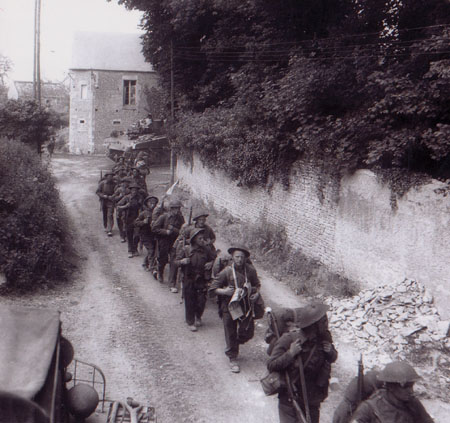
Major the Honourable Hugh Belsay led his battered infantry company through the shattered Flemish town. Completely cut off from the rest of the Durham Light Infantry, he and his men had fallen in with the decimated remnants of another group of cut-off infantry and were now making their way back to Division HQ, wherever that was. Belsay’s acting 2IC, Lieutenant Rollins, threw down the map in disgust.
“According to this map Division is three miles down this road.”
“You don’t sound convinced, Sir.” That was Sergeant Holgate, one of the few NCOs unwounded. A gritty campaigner from the Scottish borders, he had been a godsend to Belsay over the past few days.
“Sergeant, I’m amazed this damn thing even shows Brussels.”
Holgate smiled at Belsay. “We could always go there, Major.”
“No, Sergeant, not again. Once was enough. C’mon, lets ask these locals. Tom, this is your bag.”
“Righty ho Maj.” Rollins wandered over to a group of Belgian civilians. They were clustered over a newspaper and after a brief conversation amongst themselves seemed eager to help Rollins.
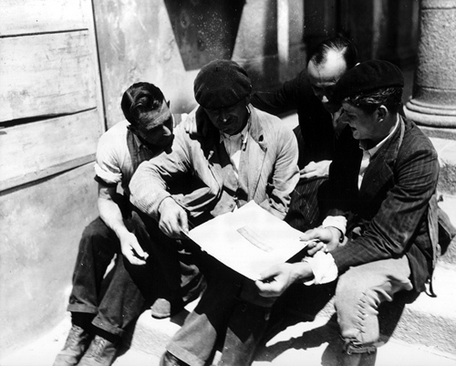
“Sir, according to the locals Division has gone. Both our Corps and the French force to the South pulled back last night.”
Belsay swore. Offering Holgate and Rollins a cigarette he lit one for himself. “So where are they?”
“I don’t know, Sir. We could keep going on this road?”
“Yep, sounds like the best plan”. He gave a pack of cigarettes to Rollins. “Give these to your group of locals and thank them for their assistance. Sergeant Holgate, ten minutes rest and then we resume the march.” Holgate saluted and took charge of the company. Christ we’re totally lost, Belsay reflected. Taking the map from Rollins Belsay gazed blankly at it. His eyes rested on a river to the South that was a natural defensive line. Its name would soon become famous in DLI history. The Dyle.
[Game Effect] - The crisis on the Western Front deepens. Will reply to comments in the next update, which takes us back to Whitehall.

Major the Honourable Hugh Belsay led his battered infantry company through the shattered Flemish town. Completely cut off from the rest of the Durham Light Infantry, he and his men had fallen in with the decimated remnants of another group of cut-off infantry and were now making their way back to Division HQ, wherever that was. Belsay’s acting 2IC, Lieutenant Rollins, threw down the map in disgust.
“According to this map Division is three miles down this road.”
“You don’t sound convinced, Sir.” That was Sergeant Holgate, one of the few NCOs unwounded. A gritty campaigner from the Scottish borders, he had been a godsend to Belsay over the past few days.
“Sergeant, I’m amazed this damn thing even shows Brussels.”
Holgate smiled at Belsay. “We could always go there, Major.”
“No, Sergeant, not again. Once was enough. C’mon, lets ask these locals. Tom, this is your bag.”
“Righty ho Maj.” Rollins wandered over to a group of Belgian civilians. They were clustered over a newspaper and after a brief conversation amongst themselves seemed eager to help Rollins.

“Sir, according to the locals Division has gone. Both our Corps and the French force to the South pulled back last night.”
Belsay swore. Offering Holgate and Rollins a cigarette he lit one for himself. “So where are they?”
“I don’t know, Sir. We could keep going on this road?”
“Yep, sounds like the best plan”. He gave a pack of cigarettes to Rollins. “Give these to your group of locals and thank them for their assistance. Sergeant Holgate, ten minutes rest and then we resume the march.” Holgate saluted and took charge of the company. Christ we’re totally lost, Belsay reflected. Taking the map from Rollins Belsay gazed blankly at it. His eyes rested on a river to the South that was a natural defensive line. Its name would soon become famous in DLI history. The Dyle.
[Game Effect] - The crisis on the Western Front deepens. Will reply to comments in the next update, which takes us back to Whitehall.
Enewald said:They are totally lost geographically or lost the war?
I think you should flip a coin to find your answer.
A heroic defence of a river line brewing?
But is is one last hurrah before fleeing to the sea or the start of holding the line? Whatever one thinks of the new PM he's not been in office long enough to change much so one must suspect the former.
But is is one last hurrah before fleeing to the sea or the start of holding the line? Whatever one thinks of the new PM he's not been in office long enough to change much so one must suspect the former.
Chapter 5, The Foreign Office, 13 May 1940
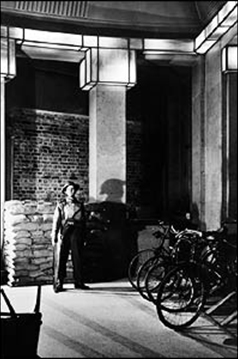
Halifax, Attlee, Chamberlain, Churchill and Sinclair had enjoyed an enjoyable if swift lunch. It had been Churchill’s idea for the “Big Five” to lunch together before assigning the key positions of Halifax’s Cabinet. Halifax, keen to avoid conflict wherever possible, had agreed and as Foreign Secretary as well as Prime Minister had invited the other four to the Foreign Office.
Nicknamed “The Palazzo” by those who work there it had a grander feel than Churchill’s realm in the Admiralty or the Georgian restraint of Downing Street. Halifax seemed confident. The resolution to allow Halifax to sit in debates in the House of Commons had been approved, and the Conventions of Whitehall as they had become known had received moderate praise by the nation. Though as a Peer Halifax was constitutionally prevented from voting in the Commons, the lawyers had approved the move to permit him to sit there and to make statements. Both the Lords and Commons had accepted this and Halifax had responded, in a move seen by The Times as “graceful” to state that he would limit himself to making statements; he intended to remove himself from debates to allow the Commons to act free from influence from the Lords. The position of Leader of the Commons would therefore be crucial: he would have to act as Halifax’s envoy and defend (as well as promote) the Government’s decisions. Churchill, confirmed as First Lord of the Admiralty as well as Minister for War was pushing for Anthony Eden.
“He is a most compelling candidate. Talented, able, and loyal.”
“Eden,” Halifax mouthed the words as though they were poisonous. “He is not loyal to me. I wemain unconvinced that he would be an asset to Cabinet! He can go to the War Office as your second if you are so certain of his merit. Are you saying that he would be an effective mouthpiece for me in the Lower House?”
“Exactly that! What better way to demonstrate to our opponents our unity!”
“Prime Minister”, that was Chamberlain, who had indicated a reluctance for ‘demanding ministry’ in Halifax’s government, though he remained Leader of the Conservative Party. “Clearly the role of Deputy Prime Minister indicates an expectation that the incumbent will deputise for you in the Lower House.”
“Erm, yes, but he should be a member of your party!” That was Attlee, newly confirmed as Deputy Prime Minister in the National Government. “You’re very quiet,” he gestured to Halifax. “Do you have someone in mind?”
Halifax nodded. “I want Rab Butler put in as Leader of the Commons. He knows my mind and was a most capable lieutenant for me here in the Foreign Office.” Attlee raised an eyebrow. Churchill raised two.
“But My Lord, Edward. He’s untested. He’s too linked with your work at Munich.” Halifax seemed unmoved.
Chamberlain interjected. “But he does know the Prime Minister, and the Prime Minster knows him.”
Churchill glowered at this unwelcome interruption. “But what about his work in the Foreign Office?”
“Well,” Halifax said with assurance, “I do intend to keep working as Foreign Secretary as well as Prime Minister. Butler will continue to help me here, but I want him marked as my man in the Commons. With the First Lord in the Commons supporting us with his, ah, eloquence,” here Halifax smiled at Churchill, “we are sure to convey our message to the Nation. So, to summarise. I will act as Prime Minister and Foreign Secretary, Mr Attlee is Deputy Prime Minister, Mr Churchill will fight the war for us…” Halifax continued, summing up the assignments. Churchill, though disappointed that he had failed to get Brendan and Max into the key positions, felt relieved that they had confirmed him as First Lord whilst adding other roles. This war would be Churchill’s to fight, assuming that Halifax wanted to fight at all.
[Game Effect] – Halifax’s government is set us as detailed below. This is actually a makeshift administration, and causes problems.
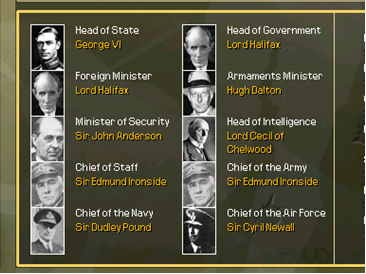
Kurt_Steiner: Don't joke! Halifax isn't keen on this war, as we'll see in the next chapter.
Enewald: Britannia has an army, though as we've seen they're bogged down (historically) in the chaos of 1940.
Nathan Madien/Trekaddict: Blast! You've read the same alt histories as me! The whole point of this AAR was to see how the game plays if 1) Halifax became PM and 2) well, wait and see but Churchill ain't happy. By 1942 the game goes slightly weird...
The whole point of this AAR was to see how the game plays if 1) Halifax became PM and 2) well, wait and see but Churchill ain't happy. By 1942 the game goes slightly weird...
El Pip: The game is currently at 1945. Halifax's fate is amusing. And yes, an update on the DLI's campaign will be coming up.
British Imperial: Agreed, terrifying

Halifax, Attlee, Chamberlain, Churchill and Sinclair had enjoyed an enjoyable if swift lunch. It had been Churchill’s idea for the “Big Five” to lunch together before assigning the key positions of Halifax’s Cabinet. Halifax, keen to avoid conflict wherever possible, had agreed and as Foreign Secretary as well as Prime Minister had invited the other four to the Foreign Office.
Nicknamed “The Palazzo” by those who work there it had a grander feel than Churchill’s realm in the Admiralty or the Georgian restraint of Downing Street. Halifax seemed confident. The resolution to allow Halifax to sit in debates in the House of Commons had been approved, and the Conventions of Whitehall as they had become known had received moderate praise by the nation. Though as a Peer Halifax was constitutionally prevented from voting in the Commons, the lawyers had approved the move to permit him to sit there and to make statements. Both the Lords and Commons had accepted this and Halifax had responded, in a move seen by The Times as “graceful” to state that he would limit himself to making statements; he intended to remove himself from debates to allow the Commons to act free from influence from the Lords. The position of Leader of the Commons would therefore be crucial: he would have to act as Halifax’s envoy and defend (as well as promote) the Government’s decisions. Churchill, confirmed as First Lord of the Admiralty as well as Minister for War was pushing for Anthony Eden.
“He is a most compelling candidate. Talented, able, and loyal.”
“Eden,” Halifax mouthed the words as though they were poisonous. “He is not loyal to me. I wemain unconvinced that he would be an asset to Cabinet! He can go to the War Office as your second if you are so certain of his merit. Are you saying that he would be an effective mouthpiece for me in the Lower House?”
“Exactly that! What better way to demonstrate to our opponents our unity!”
“Prime Minister”, that was Chamberlain, who had indicated a reluctance for ‘demanding ministry’ in Halifax’s government, though he remained Leader of the Conservative Party. “Clearly the role of Deputy Prime Minister indicates an expectation that the incumbent will deputise for you in the Lower House.”
“Erm, yes, but he should be a member of your party!” That was Attlee, newly confirmed as Deputy Prime Minister in the National Government. “You’re very quiet,” he gestured to Halifax. “Do you have someone in mind?”
Halifax nodded. “I want Rab Butler put in as Leader of the Commons. He knows my mind and was a most capable lieutenant for me here in the Foreign Office.” Attlee raised an eyebrow. Churchill raised two.
“But My Lord, Edward. He’s untested. He’s too linked with your work at Munich.” Halifax seemed unmoved.
Chamberlain interjected. “But he does know the Prime Minister, and the Prime Minster knows him.”
Churchill glowered at this unwelcome interruption. “But what about his work in the Foreign Office?”
“Well,” Halifax said with assurance, “I do intend to keep working as Foreign Secretary as well as Prime Minister. Butler will continue to help me here, but I want him marked as my man in the Commons. With the First Lord in the Commons supporting us with his, ah, eloquence,” here Halifax smiled at Churchill, “we are sure to convey our message to the Nation. So, to summarise. I will act as Prime Minister and Foreign Secretary, Mr Attlee is Deputy Prime Minister, Mr Churchill will fight the war for us…” Halifax continued, summing up the assignments. Churchill, though disappointed that he had failed to get Brendan and Max into the key positions, felt relieved that they had confirmed him as First Lord whilst adding other roles. This war would be Churchill’s to fight, assuming that Halifax wanted to fight at all.
[Game Effect] – Halifax’s government is set us as detailed below. This is actually a makeshift administration, and causes problems.

Kurt_Steiner: Don't joke! Halifax isn't keen on this war, as we'll see in the next chapter.
Enewald: Britannia has an army, though as we've seen they're bogged down (historically) in the chaos of 1940.
Nathan Madien/Trekaddict: Blast! You've read the same alt histories as me!
El Pip: The game is currently at 1945. Halifax's fate is amusing. And yes, an update on the DLI's campaign will be coming up.
British Imperial: Agreed, terrifying
I am a bit confused. If Halifax is the Prime Minister, why is Chamberlain the leader of the Conservative Party? Shouldn't Halifax be the leader? 
By the way, Halifax has a weird minister picture. He looks like he just ate something awful.
By the way, Halifax has a weird minister picture. He looks like he just ate something awful.
It's the self loathing. Even he hates himself, just seeing himself in the mirror makes him feel ill. Proof he isn't entirely stupid.Nathan Madien said:By the way, Halifax has a weird minister picture. He looks like he just ate something awful.

Worrying sign seeing Halifax retain the Foreign Office, then again I suppose it will help when talking to neutrals, you can hardly accuse him of being a war monger only interested in conquest!
Nathan Madien said:I am a bit confused. If Halifax is the Prime Minister, why is Chamberlain the leader of the Conservative Party? Shouldn't Halifax be the leader?
By the way, Halifax has a weird minister picture. He looks like he just ate something awful.
No. Chamberlain remained as Leader of the Party (temporarily) when Churchill (or Halifax in this case) became PM. As it was a National Government Chamberlain could constitutionally remain leader of the Tories whilst another led the united Government. In essence whoever succeeded Chamberlain had an incredibly difficult line to tread, given his popularity within the Conservative Party. Churchill was incredibly gracious and Chamberlain would later write in his diary:
"Winston has been unstinting in his generosity. He knows that the Government relies upon Halifax and me."
trekaddict said:I now it's irrational, but I primarily don't like Halifax because I once read an Alternate History where he couped against Churchill in 1940, made a peace with the Germans, got the UK occupied, made it possible for the Nazis to advance to the slope of the Urals which in turn lead to the total annihilation of Germany via Nuclear weapons in 1947, when the US nuked every town with more than 5000 inhabitants.
It can be bought via Amazon I think, it's called "The Big One".
If you are an alternate history fan I fully recommend it.
Anyways back to the AAR. :rofl:
Le Jones said:No. Chamberlain remained as Leader of the Party (temporarily) when Churchill (or Halifax in this case) became PM. As it was a National Government Chamberlain could constitutionally remain leader of the Tories whilst another led the united Government. In essence whoever succeeded Chamberlain had an incredibly difficult line to tread, given his popularity within the Conservative Party. Churchill was incredibly gracious and Chamberlain would later write in his diary:
"Winston has been unstinting in his generosity. He knows that the Government relies upon Halifax and me."
Ah, I see. I assumed that Prime Ministers were always the leaders of their parties. It turns out they are not.
Le Jones said:...Some of the pictures of Halifax that I've collected for this AAR are hilarious.
I can't wait to see them.
Nathan Madien said:Ah, I see. I assumed that Prime Ministers were always the leaders of their parties. It turns out they are not.
I can't wait to see them.
Well, usually you'd be spot on - however 1940 was not usual!
The lack of a written constitution does allow, flexibility, over such matters. Whether that is actually a good or a bad thing depends very much on where you're observing events from.Nathan Madien said:Ah, I see. I assumed that Prime Ministers were always the leaders of their parties. It turns out they are not.
Brace yourselves...
Chapter 6, Downing Street, 13 May 1940
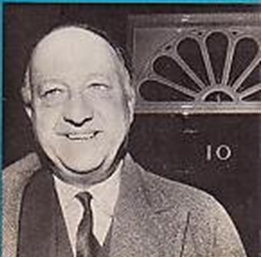
Richard Austen Butler was a man born with greatness in a traditional English pursuit in mind. His life had been one of opportunity to shine in the groves of academia, or the corridors of power. But there were several handicaps. The riding accident that had left his right hand withered, with its inevitable limp handshake. The lack of military experience in the war, that had marked him out amongst the veterans in the House. But he was Halifax’s man and as such had high hopes as his car approached Downing Street. Despite the lateness of the hour Downing Street was busy, with civil and military officials scurrying with the latest news of the war. The Policeman gave the slightest of nods as he opened the door.
"Prime Minister,” gasped Butler as he entered 10 Downing Street. “Your call said it was urgent.”
“Richard, please, take a seat. May I offer you tea?” Butler nodded his assent. “I’ve decided that I need to stwenghten my position in the Commons.”
“Well, we’ve done that. We’ve passed the convention, you can take part in debates-”
“Richard, you know me, you know I am not particularly good at cut and thrust debate. I prefer that as Prime Minister, especially at this time, I conduct myself as a gentleman. As a Peer I cannot in all truth maintain the post of Leader of the House of Commons. But you can.”
“But, I thought, the post of Foreign Secretary…”
“Will remain with me, Richard. Now, more than ever, we must ensure that the message we send to Europe does not change. No, I need you to act as my man in the Commons. As my mouthpiece to the Lower House you will have my prestige and authority to argue the Government’s position. Of course, you will be a member of the Cabinet.”
“Thank you Prime Minister.” Butler looked far from grateful. “I’ve always tried to support Neville, and you, and I thought my efforts would be worthy of…” he struggled hard not to say ‘reward’ or ‘recognition’. “I thought they could be best employed in a ministry, where I could continue to fight for you.”
Halifax nodded. He had, in truth, expected this and was prepared with his rejoinder. “Richard, I intend to bring this war to a close. I will do whatever is reasonable to bring peace to Europe. If I am successful, there will have to be an election.”
“Of course.”
“Well, if I am re-elected then I will offer you one of the more senior ministerial positions. There will have to be a reshuffle and as my lieutenant in the Commons you will have an important role in shaping my Government.” There was one other aspect, some important point, that Butler sensed Halifax was avoiding. Seeing Butler’s suspicion he sighed and confessed. “Besides, as the man who led the peace delegation you could not be refused a high office.”
“But, Prime Minister…”
“I’ve just received the Italian and Spanish ambassadors.”
“Bastianni? I wasn’t told…” Butler began, slightly offended.
“It was sub rosa at that stage, though now I need to bring others into the confidence. The Germans may be willing to talk. Ciano has invited me to send a representative to Italy to meet with him and someone from the German government. If I go the papers will find out, which would lead to an awful stink. Questions in the House now would not be helpful. No, I need someone else to go in my stead. I would like it to be you.” Halifax nodded confidently as he continued. “The Italians will send an invitation and you will fly out. You can give your first statement to the House tomorrow as Leader of the Commons, and then you will lead our efforts in ending this war.”
Butler was already ahead of his Prime Minister. Looking into the fireplace he saw himself returning home having saved Britain. Chamberlain and Halifax could start a war but it would take RA Butler to end it. Nodding in acceptance to a relieved Halifax, Butler was suddenly optimistic.
[Game Effect] - None at this stage. I am convinced that Halifax would attempt to wriggle out of the war. He made a tentative approach to Ciano (with Churchill's consent) during the Battle for France but was rebuffed. As PM his powers to shape policy would be greater, and any envoy to Berlin would carry Halifax's support.
Chapter 6, Downing Street, 13 May 1940

Richard Austen Butler was a man born with greatness in a traditional English pursuit in mind. His life had been one of opportunity to shine in the groves of academia, or the corridors of power. But there were several handicaps. The riding accident that had left his right hand withered, with its inevitable limp handshake. The lack of military experience in the war, that had marked him out amongst the veterans in the House. But he was Halifax’s man and as such had high hopes as his car approached Downing Street. Despite the lateness of the hour Downing Street was busy, with civil and military officials scurrying with the latest news of the war. The Policeman gave the slightest of nods as he opened the door.
"Prime Minister,” gasped Butler as he entered 10 Downing Street. “Your call said it was urgent.”
“Richard, please, take a seat. May I offer you tea?” Butler nodded his assent. “I’ve decided that I need to stwenghten my position in the Commons.”
“Well, we’ve done that. We’ve passed the convention, you can take part in debates-”
“Richard, you know me, you know I am not particularly good at cut and thrust debate. I prefer that as Prime Minister, especially at this time, I conduct myself as a gentleman. As a Peer I cannot in all truth maintain the post of Leader of the House of Commons. But you can.”
“But, I thought, the post of Foreign Secretary…”
“Will remain with me, Richard. Now, more than ever, we must ensure that the message we send to Europe does not change. No, I need you to act as my man in the Commons. As my mouthpiece to the Lower House you will have my prestige and authority to argue the Government’s position. Of course, you will be a member of the Cabinet.”
“Thank you Prime Minister.” Butler looked far from grateful. “I’ve always tried to support Neville, and you, and I thought my efforts would be worthy of…” he struggled hard not to say ‘reward’ or ‘recognition’. “I thought they could be best employed in a ministry, where I could continue to fight for you.”
Halifax nodded. He had, in truth, expected this and was prepared with his rejoinder. “Richard, I intend to bring this war to a close. I will do whatever is reasonable to bring peace to Europe. If I am successful, there will have to be an election.”
“Of course.”
“Well, if I am re-elected then I will offer you one of the more senior ministerial positions. There will have to be a reshuffle and as my lieutenant in the Commons you will have an important role in shaping my Government.” There was one other aspect, some important point, that Butler sensed Halifax was avoiding. Seeing Butler’s suspicion he sighed and confessed. “Besides, as the man who led the peace delegation you could not be refused a high office.”
“But, Prime Minister…”
“I’ve just received the Italian and Spanish ambassadors.”
“Bastianni? I wasn’t told…” Butler began, slightly offended.
“It was sub rosa at that stage, though now I need to bring others into the confidence. The Germans may be willing to talk. Ciano has invited me to send a representative to Italy to meet with him and someone from the German government. If I go the papers will find out, which would lead to an awful stink. Questions in the House now would not be helpful. No, I need someone else to go in my stead. I would like it to be you.” Halifax nodded confidently as he continued. “The Italians will send an invitation and you will fly out. You can give your first statement to the House tomorrow as Leader of the Commons, and then you will lead our efforts in ending this war.”
Butler was already ahead of his Prime Minister. Looking into the fireplace he saw himself returning home having saved Britain. Chamberlain and Halifax could start a war but it would take RA Butler to end it. Nodding in acceptance to a relieved Halifax, Butler was suddenly optimistic.
[Game Effect] - None at this stage. I am convinced that Halifax would attempt to wriggle out of the war. He made a tentative approach to Ciano (with Churchill's consent) during the Battle for France but was rebuffed. As PM his powers to shape policy would be greater, and any envoy to Berlin would carry Halifax's support.
Last edited:

